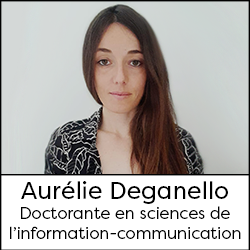[Portrait] Aurélie DEGANELLO, Doctoral student in information and communication sciences at the Norbert Elias Centre
What is your research about?
I'm doing a thesis as part of a project funded by ADEME, the French Environment and Energy Management Agency, to study a socio-scientific controversy about the impact of onshore wind turbines on cattle farms.
In some parts of France, wind turbines and other electrical infrastructure are considered by some livestock farmers to be the cause of problems observed on their farms. A controversy has arisen because, to date, despite the very serious impact on animal health and also on the economy, no scientific study has been able to provide any real proof of causality between the presence of these infrastructures and the problems observed in cattle.

The aim of my research is therefore to study the controversy surrounding the link between animal health and electrical infrastructure, by looking at the way in which the various players understand and make sense of the situation, and at the way in which the controversy is told. The subject also raises broader issues relating to energy and agriculture, requiring a methodological approach that draws on different fields of social sciences and humanities. My work will involve an analysis of the media to understand how the subject is developing in the press and on digital social networks, as well as a field survey of the players involved in the controversy.
What are your current scientific activities?
I started my PhD in March 2024, so I'm at the beginning of the thesis. In a few days' time, however, I'm going to be presenting my subject at the Centre Norbert Elias's 'Ecologies and Care of Living Worlds' study day, which will be entitled 'Wind turbines: controversy over animal health'.
Why did you choose to work in academic research?
Doing research has always been a stimulating activity for me. I taught secondary school for a while before I had the opportunity to start this PhD. I trained in social anthropology and my work focused on nuclear power in Japan. I'm particularly interested in developing a social humanities approach to understanding socially sensitive issues, particularly those centred on controversies around energy production. It was really this attraction for these subjects that motivated my choice to work in academic research.
What advice would you give to students who want to do research?
Research is an exciting and demanding field in many respects, requiring a great deal of autonomy, perseverance and collaborative skills. I think it's vital to choose your subject carefully, because intellectual motivation throughout the research process is essential to its success. It is also important to surround yourself with people who are rich in human and intellectual resources and who can contribute to building an environment that encourages reflection and exchange.
The Norbert Elias Centre (UMR 8562)
The Norbert Elias Centre (UMR 8562) brings together researchers from different disciplines who are convinced of the unity of the human and social sciences. The laboratory is located on the EHESS Marseille campus at Vieille Charité and on the Hannah Arendt campus at Avignon University. It brings together 50 researchers, 80 doctoral students and a support team of about ten people who work on the analysis and description of social worlds.
>> Read more
The portraits
Updated on 21 May 2024